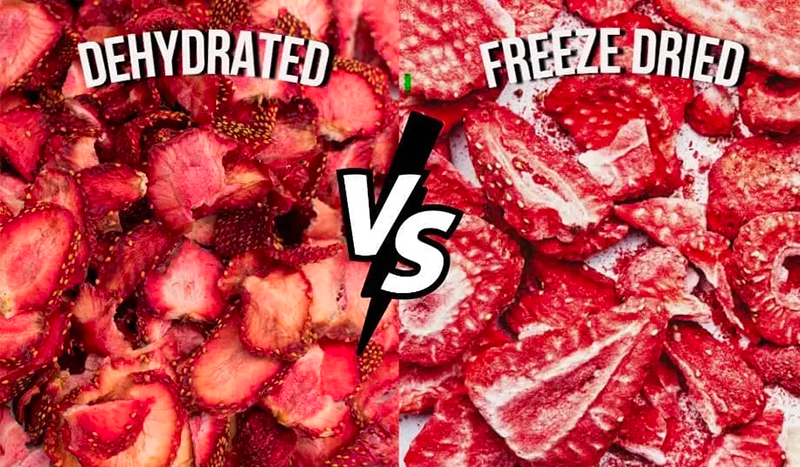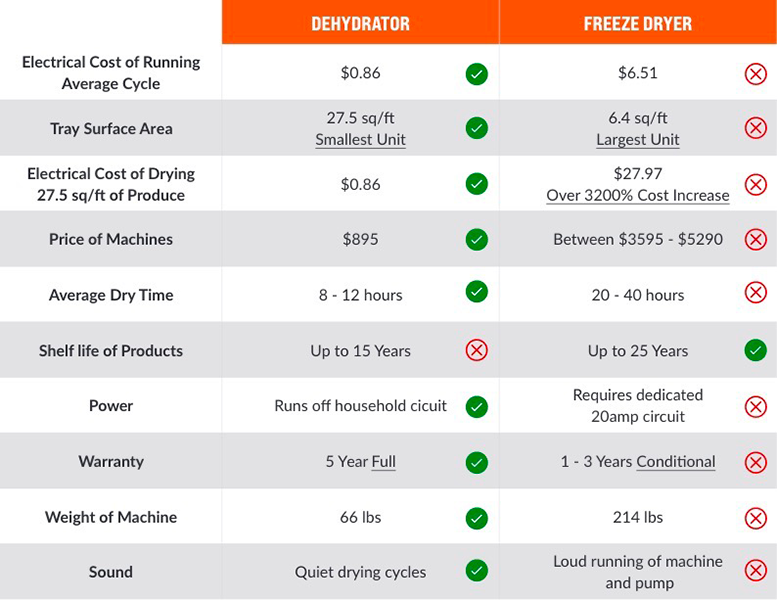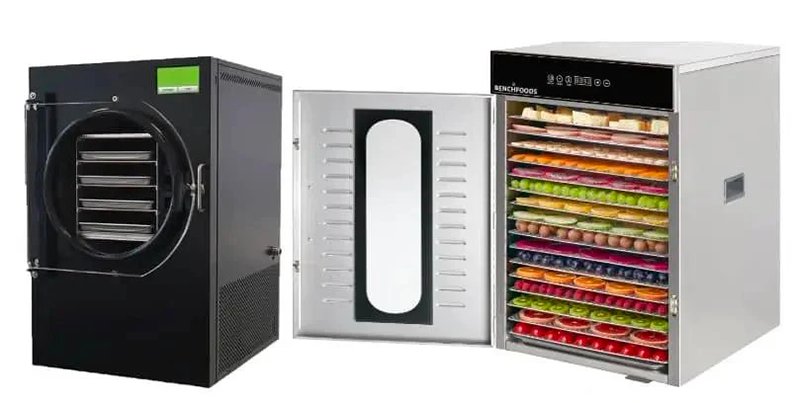
Content Menu
● Understanding Food Dehydrators
>> How Food Dehydrators Work
>> Benefits of Using a Food Dehydrator
● Understanding Freeze Dryers
>> How Freeze Dryers Work
>> Benefits of Using a Freeze Dryer
● Key Differences Between Food Dehydrators and Freeze Dryers
● Choosing Between a Food Dehydrator and a Freeze Dryer
● Nutritional Comparison
● Texture and Flavor Retention
● Practical Applications
>> Food Dehydrator Applications
>> Freeze Dryer Applications
● Conclusion
● FAQs
>> 1. Is a food dehydrator the same as a freeze dryer?
>> 2. Can I use a dehydrator for long-term storage?
>> 3. Which method retains more nutrients?
>> 4. Are there any foods that cannot be freeze-dried?
>> 5. How do I know which machine is right for me?
● Citations:
Food preservation is an essential practice that extends the shelf life of various products, allowing us to enjoy seasonal fruits and vegetables year-round. Among the most popular methods for preserving food are food dehydrators and freeze dryers. Although both serve the same purpose of removing moisture from food to prevent spoilage, they operate through different mechanisms and yield distinct results. This article will explore the differences between food dehydrators and freeze dryers, helping you make an informed decision based on your needs.

Understanding Food Dehydrators
A food dehydrator is a kitchen appliance designed to remove moisture from food using heat and airflow. This method of preservation has been used for centuries and is particularly effective for fruits, vegetables, herbs, and meats.
How Food Dehydrators Work
- Heating Mechanism: Dehydrators use electric heat to warm air, which is then circulated around the food. This process evaporates moisture.
- Temperature Control: Most dehydrators allow users to set specific temperatures, typically ranging from 95°F to 165°F (35°C to 74°C), depending on the type of food being dried.
- Time Efficiency: The drying process usually takes between 6 to 12 hours, depending on the moisture content of the food and the temperature setting.
Benefits of Using a Food Dehydrator
- Cost-Effective: Dehydrators are generally more affordable than freeze dryers, making them accessible for home cooks and casual users.
- Simplicity: They are easy to use; simply slice the food, set the temperature, and let it run.
- Versatility: Ideal for making snacks like fruit leathers, jerky, and dried herbs.
- Space Saving: Dehydrated foods take up much less storage space compared to fresh produce or frozen items.
- Long Shelf Life: Properly dehydrated foods can last for years without refrigeration, reducing food waste and enhancing food security.

Understanding Freeze Dryers
A freeze dryer, on the other hand, employs a more complex process known as sublimation to preserve food. This method is often used in commercial settings but is becoming increasingly popular among home users who want to store food for extended periods.
How Freeze Dryers Work
- Freezing Phase: The process begins by freezing the food at extremely low temperatures (around -40°F or -40°C).
- Vacuum Environment: Once frozen, a vacuum is created around the food. This vacuum lowers the pressure, allowing ice in the food to transform directly into vapor without passing through a liquid phase (a process known as sublimation).
- Longer Duration: The entire process can take anywhere from 20 to 40 hours, depending on the type of food being freeze-dried.
Benefits of Using a Freeze Dryer
- Nutrient Retention: Freeze drying preserves about 97% of the original nutrients in food compared to only 60-75% in dehydrated foods.
- Extended Shelf Life: Foods preserved through freeze drying can last up to 25 years or more when stored properly.
- Texture and Flavor Preservation: The texture and flavor of freeze-dried foods remain closer to their fresh counterparts compared to dehydrated foods.
- Lightweight: Removing almost all moisture makes freeze-dried foods extremely light, which is perfect for backpacking, camping, and space travel.
Key Differences Between Food Dehydrators and Freeze Dryers
| Feature | Food Dehydrator | Freeze Dryer |
| Moisture Removal | Removes 85%-95% moisture | Removes up to 99% moisture |
| Nutritional Value Retention | 60%-75% retained | Approximately 97% retained |
| Shelf Life | Several months to 1 year | 15 to 25 years or more |
| Cost | Generally less expensive | Higher initial investment |
| Process Duration | 6 to 12 hours | 20 to 40 hours |
| Ideal Uses | Snacks, herbs, jerky | Long-term storage of fruits, meals, etc. |
Choosing Between a Food Dehydrator and a Freeze Dryer
When deciding between a food dehydrator and a freeze dryer, consider several factors:
- Budget: If you are looking for an economical option for occasional use, a dehydrator may be best. However, if you plan on long-term storage of large quantities of food, investing in a freeze dryer could be worthwhile.
- Storage Needs: For those needing long-term preservation with minimal nutrient loss (like preppers or those preserving meals for emergencies), a freeze dryer is preferable.
- Food Types: Consider what types of foods you plan to preserve. If you mainly want snacks or short-term storage options, a dehydrator suffices. For complete meals or delicate items (like fruits), freeze drying is superior.
Nutritional Comparison
The nutritional retention of both methods varies significantly due to their differing processes:
- Vitamins and Minerals: Freeze-dried foods retain most vitamins and minerals due to the low temperatures used during processing. In contrast, dehydrated foods can lose significant amounts of heat-sensitive vitamins such as Vitamin C during the drying process.
- Fiber Content: Both methods retain fiber content well; however, freeze-drying preserves more nutrients overall due to its gentle processing conditions.
Texture and Flavor Retention
The texture and flavor profiles of foods processed by these two methods also differ:
- Dehydrated Foods: Often appear shriveled or tough. They may require rehydration before consumption but can still be delicious when properly seasoned or cooked.
- Freeze-Dried Foods: Maintain their original structure better than dehydrated foods. They rehydrate quickly and closely resemble their fresh state in terms of texture and flavor when prepared correctly.
Practical Applications
Both methods have unique applications based on user needs:
Food Dehydrator Applications
- Making healthy snacks like fruit chips or vegetable crisps.
- Creating homemade jerky from various meats.
- Preserving herbs for culinary use throughout the year.
- Preparing fruit leathers for children's snacks.
Freeze Dryer Applications
- Preparing complete meals for long-term storage (ideal for camping or emergency preparedness).
- Preserving delicate fruits like berries that might not dehydrate well.
- Storing bulk quantities of seasonal produce without losing quality.
Conclusion
In conclusion, both food dehydrators and freeze dryers serve essential roles in food preservation but cater to different needs. A dehydrator is suitable for everyday use and offers simplicity at a lower cost. In contrast, a freeze dryer excels in nutrient retention and long-term storage capabilities but requires more investment and time. Ultimately, your choice should reflect your specific preservation goals, budget constraints, and available space in your kitchen.

FAQs
1. Is a food dehydrator the same as a freeze dryer?
No, they are not the same. A dehydrator uses heat to remove moisture from food while a freeze dryer uses cold temperatures and vacuum conditions to achieve moisture removal through sublimation.
2. Can I use a dehydrator for long-term storage?
While you can use a dehydrator for longer storage than fresh foods, its shelf life typically ranges from several months up to one year compared to many years with freeze-dried foods.
3. Which method retains more nutrients?
Freeze drying retains significantly more nutrients—about 97%—compared to around 60%-75% retained by dehydrating methods.
4. Are there any foods that cannot be freeze-dried?
Yes, certain foods with high-fat content (like avocados) do not freeze dry well because they can become rancid over time.
5. How do I know which machine is right for me?
Consider your budget, how often you'll use it, what types of foods you'll preserve, and how long you need them stored before making your decision.
Citations:
[1] https://greenthumbdepot.com/blogs/guides/food-dehydrator-vs-freeze-dryer
[2] https://www.lowes.com/n/buying-guide/freeze-dryer-vs-dehydrator
[3] https://www.commercialdehydrators.com.au/dehydrating-recipes-filters
[4] https://www.theseasonalhomestead.com/how-to-use-a-freeze-dryer-tips/
[5] https://thereadystore.com/a/blog/post/dehydrated-vs-freeze-dried-food
[6] https://harvestright.com/freeze-drying-vs-dehydrating/
[7] https://sedpharma.com/news-events/freeze-dryer-vs-dehydrator/
[8] https://www.youtube.com/watch?v=rXNIHzcE8F0
[9] https://www.youtube.com/watch?v=3KjO0-EJHHQ
[10] https://kanpaifoods.com/blogs/news/freeze-dry-vs-dehydrated-foods-comparing-preservation-methods











